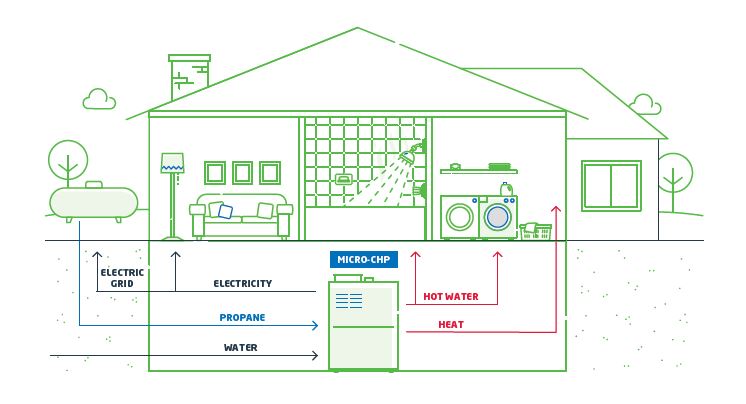As the electrical grid becomes increasingly less stable, wildfires rage, and we are continually subject to public safety power shut offs, many are looking to alternatives to power their homes independently. Combined heat and power systems (CHP) are a solution. Below we discuss what these systems are, how they work, and the benefits of installed a propane powered, all-in-one home generation system.
What is CHP?
CHPs, also known as cogeneration systems, work like a boiler. These systems can heat your home, heat your water, and produce electricity – all in one. Traditionally, these systems are used in large operations, like hotels, that require mass amounts of hot water. Micro-CHP are smaller versions intended for residential and small commercial use. These systems produce at maximum 50 kilowatts (kW) of electricity. Most single-family homes can run on a unit producing just one to three kilowatts.
How CHP Systems Work
Here is a simplified explanation provided by the Propane Education and Research Council of how these systems produce power and heat for your home:
- Propane powers and engine or turbine.
- The fuel is powering the mechanical system of a generator. That generator is creating electricity.
- Electricity is funneled into the building/home much like it would be from the electric grid.
- Waste heat from the generator heats water via a heat exchanger.
- Hot water is then available for domestic use.
- Excess hot water is stored in a buffer tank.

There are many benefits to powering your home with a propane CHP. The first is that these units are more efficient than receiving your heat and electricity from separate sources. To that end, because they capture heat waste and reuse it, CHPs use 50% less fuel than a power generation site would to produce an equivalent amount of the grid’s electricity. This also means greenhouse gas emissions are cut in half. Second, they help your home or commercial building move away from grid connection thus decreasing your subjectivity to public safety power shut offs and line losses from electricity transmission. Did you know the electricity from the grid that powers your home is only 60% efficient by the time it reaches you? Propane CHP units are 85% efficient because the power is being generated closer to where it is needed. Third, just as with solar panels, you may have the opportunity to sell your excess generated electricity back to the utility company.
For more information about CHP units, contact your local DLE office.
*Please note these units are not yet certified by the California Air Resources Board. This post is informational only and will be updated as more resources become available.
Additional Sources:
Linkedin Article by Eric Burgis
Printable Version of our DLE Propane Press Winter 2022
